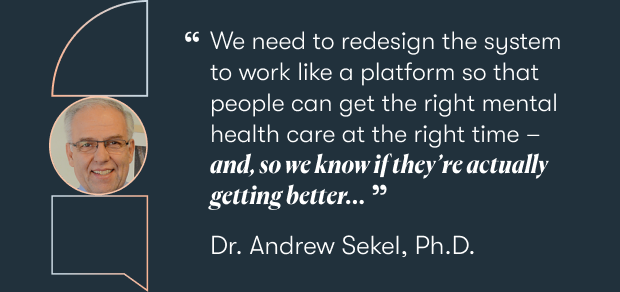
What's the upside to building a digital approach to mental health? Do we need one, and if so, why?
This article includes an audio and video file, along with a text excerpt of Twill's recent interview with Dr. Andy Sekel, Ph.D., the Managing Partner at Marketplace Funds, and former Chief Executive Officer for Optum Specialty Networks, where he oversaw (among other things) clinical services for behavioral health.
The team at Twill recently begin publishing our own audio programming with the hope of building a content library full of meaningful conversations from leaders in digital health, that we will curate onto popular audio and video platforms.
We published the full interview with Dr. Sekel last week. In our first episode, Dr. Sekel, discusses the opportunity business leaders have, as we emerge from lock-down, to rethink their approach to, and investments in, information technology in the workplace.
In this interview excerpt, Twill's SVP of Sales, Brendon Kelly, asks Dr. Sekel, what exactly the mental health cognoscente are getting wrong when it comes to treating mental illness.
Interview Excerpt Transcript
|
Brendon Kelly: My next question is, why does everybody get this so wrong? Dr. Andy Sekel, Ph.D.: Well, that's an interesting question. I don't think anyone is meaning to get it wrong. I think the important is to understand that much of this is historical, much of this is, like I said, the most common way people practice, not the philosophy of the practice, but just the physical structure has come to my office and spend 50 minutes. And so, we just haven't adapted. We don't have the equivalent of emergency services in mental health. We don't have the capabilities to treat people in a variety of different ways. And that's what I think digital health is really introducing into the system. We can provide treatment in a different way that's much more adapted to current environmental issues of how people work, how people live. And that's the promise of the work that we're doing at Happify is the promise of the work that people are doing at a lot of digital healthcare companies. But there's also kind of a threat about that, which is we can't just plug these in Willy-Nilly into some system and hope it gets better. Part of what I was trying to articulate in the article is we have to redesign the system and we have to redesign it for digital to be first. I think we need to redesign it to look like a platform and to act like a platform so that when people come into service, we know where they get the best care and we need to know how to track the outcomes of their care, not the particulars of what they're talking about, but are they doing better or are they doing worse. And then make adjustments to their care and the way they get care, that really fits that individual. What I'm really talking about is individualized attention to patients so that we can provide the best care possible for them. |
Additional resources:
- Dr. Andrew Sekel's Editorial: A Digital First vs. Digitally Enhanced Approach to Behavioral Health
- Listen to the complete interview with Dr. Sekel: Where Mental Health Still Misses the Mark
- Downloadable guide: How (and Why) to Implement Digital First Behavioral Health Solutions
- See How Twill Can Help Your Business: Schedule a Demo
